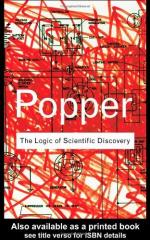
|
| Name: _________________________ | Period: ___________________ |
This test consists of 5 multiple choice questions, 5 short answer questions, and 10 short essay questions.
Multiple Choice Questions
1. What is able to refute portions of old theories?
(a) New experiments.
(b) Quantum physics.
(c) Logic.
(d) New theories.
2. What relationships does Popper explore in chapter 8?
(a) Probability and experience.
(b) Probability and scientific fact.
(c) Probability and assumptions.
(d) Probability and simplicity.
3. What does not requires one to change the number of parameters of the displacements of groups of points.
(a) Simplicity.
(b) Geometrical curves.
(c) Sine waves.
(d) Physics.
4. What formula, developed by Popper, suggests that no aggregate of particles is more homogeneous than a pure case?
(a) Particle formula.
(b) Statistical scatter relations formula.
(c) Statistical pure case formula.
(d) Wave formula.
5. Where does information about precision come from?
(a) Examining ranges.
(b) Examining assumed information.
(c) Examining objective information.
(d) Examining concrete information.
Short Answer Questions
1. What involves considering the number of favorable cases divided by the number of possible cases?
2. By seeking the highest degree of universality and precision, what type of content results?
3. What type of classes are singled out and can not be subject to the rigors of scientific empirical scrutiny?
4. What view of probability depends on inductive logic?
5. What does Popper claim can never be probable?
Short Essay Questions
1. Why do falsifiable statements hold the greatest promise for science?
2. How is differentiation possible between theories whose differences are small and difficult to calculate?
3. What is the basic contribution that Popper makes to the logic of the theory of probability?
4. What rule does Popper use when discussing the importance of probability in terms of physics?
5. Why does Popper prefer quantitative over qualitative methods?
6. What is the position taken to make the argument for sample selection in research?
7. What does Popper demonstrate by using probability theory?
8. How does Popper feel traditional inductivists work?
9. What does Popper suggest about corroborations?
10. How is the theory of chance solved?
|
This section contains 784 words (approx. 3 pages at 300 words per page) |

|




